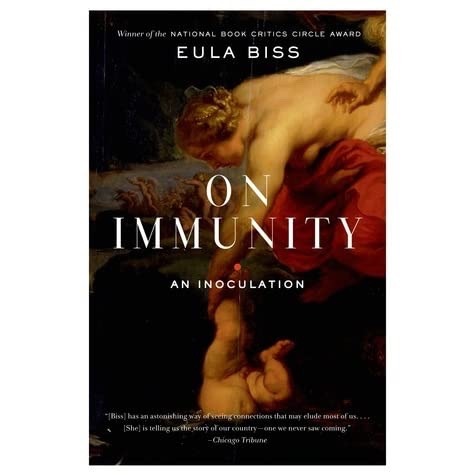
On Immunity: An Inoculation (Fitzcarraldo Editions) by Eula Biss
“We are continuous with everything on earth,” writes Eula Biss in On Immunity, “including, and especially, each other.” The boundaries between bodies and the individuals that inhabit them are made porous by Biss in this timely discussion of immunisation, which weaves cultural history with contemporary debate in compelling ways. The book’s subtitle “An Inoculation” references a letter by Voltaire, “On Inoculation”, written in 1733, just as the term was starting to signify grafting disease on to the body – it had previously been used in the context of plant cultivation. Biss points out that, contrary to the optimistic Enlightenment values with which Voltaire is associated, the philosopher expressed a healthy deal of scepticism in his writings, to reason that what seems like rational thinking may be built on irrational bases or influenced by emotional impulses.
It is Biss’s aim in writing this book to think through the factors influencing her often contradictory thought processes as a new mother around the health of her child – to work as rationally as possible, without losing her compassion, to overcome “habits of thought” that often lead to false assumptions. Writing on the side of parents, from the bedside of her sleeping son, she analyses the escalation of her anxieties as she reads various scientific reports and articles online, in order to dispel the myths circulating around the immunisation debate in America. She persuades, calmly, through the poetic rhythm of her research, that to vaccinate is imperative.
Dispelling media myths around the supposed dangers of vaccination – does the MMR vaccine cause autism, does Hib disease really affect infants, is it cruel to subject a baby to numerous strains of disease? – means calling upon the lessons of ancient myths, the kind told as bedtime stories, like that of Achilles or the tales of the Brothers Grimm. She moves from the nursery room to the World Health Organisation as only an agile essayist is able, continuing to bridge the personal and the political as she did in her previous collection Notes from No Man’s Land (2009), on racial identity in America. As her peers in literary non-fiction Rebecca Solnit and Marina Warner are well aware, these myths enable us to imagine collectively, moving from the individual to the communal.
So too, do metaphors – Sontag’s Illness as Metaphor is foundational for Biss’s approach, and, through drawing attention to the backstories of words, the present-day author reminds us of our reliance on the figurative to understand our bodies and the world. Biss recounts one study by anthropologist Emily Martin during the Iraq conflict on scientists’ opinions of analogies of the body at war, which underlined how such “metaphors of military defense permeate our imagination of the immune system.” In envisaging antibodies overcoming antigens, our default thought process is that of “us” and “them”. Viruses propagate as easily as fears, arrive on boats, infiltrate communities ... But the body contains billions of bacteria; our adaptive, immune-strengthening DNA is thought to mimic that of viruses; and our skin’s envelope is more permeable than such “troubling dualisms” (Donna Haraway, cited by Biss) would make believe.
The realisation that immunity transcends mental preconceptions and operates silently beneath the surface of reality propels Biss’s enquiry. This idea that community may be considered not only in terms of shared relations and ideologies but in terms of interacting bodies or, further, biologies, remains with me long after closing the book. It might seem a simple statement to a scientist already familiar with the function of “herd immunity”, where the many shield the few, or for whom collective nouns – microbial communities, clusters of cells – are embedded in the lexicon, but Biss bravely brings this science to the social. Even if we don’t share experiences or words with others in our proximity, we share germs. It is in this respect that Biss succeeds in her conclusion that “we owe each other our bodies”, to convince that immunisation should be thought of not only as a means of self-protection but as a form of human solidarity.

